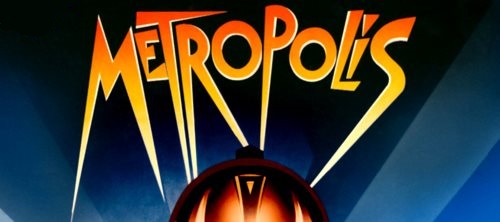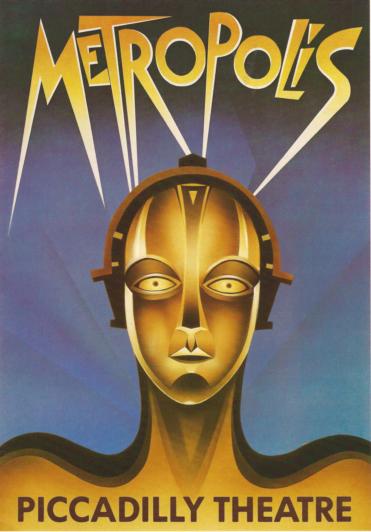Metropolis
Musical (1989)

Metropolis is a musical based on the 1927 silent movie of the same name that was staged at the Piccadilly Theatre in London in 1989. The music was written by Joe Brooks, the lyrics by Dusty Hughes. The show was directed by Jerome Savary. The cast included Judy Kuhn, Brian Blessed, Graham Bickley, Jonathan Adams, Paul Keown and Stifyn Parri.
After that time Joe Brooks worked with American Randy Bowser at editing the already finished musical. By 2002 they had created a more complete libretto to the show, and it was first produced at the Pentacle Theater in Salem, Oregon.
Main changes between the silent film and the musical are name changes for many of the characters (Joh Fredersen = John Freeman, Freder Fredersen = Steven, Rotwang = Warner, Hel = Helen), slightly different religious themes, a completely different ending, and a larger focus on the children.
The city of Metropolis - around the year 2000. The workers operate vast machines below the city and power the privileged lives of the upper class on the surface of the city. Workers are forbidden to read and to learn. They never see daylight.
The city was built by John Freeman, who now runs it like a despot. His son, Steven, lives the privileged life of the sons of the upper class playing games and taking his pleasures in the Eternal Gardens, ignorant of the dark secrets below the city.
Soon, he discovers a young woman from the lower depths of the city. Maria escapes briefly from "down below" in an effort to educate the children of the workers how the rich enjoy themselves. In pursuit of this vision, Steven ends up at one of the machines. Shocked by seeing how the workers suffer for no meaningful purpose, he trades places with worker 11811 (George). A group of discontented workers poised for revolution attend inspirational homilies given by Maria in the catacombs.
Meanwhile, the inventor, Warner, has developed a human-like female machine - 'Futura'. John Freeman wants to use the machine to deceive his son Steven and the workers as an attempt to break down the burgeoning resistance. Freeman wants the machine to take the form of Maria and to use it to discredit and destroy her.
Afficher le synopsis détaillé
Metropolis is a city, is the invention of John Freeman. It is a city that exists in a world of perpetual night, a world that has had its energy resources exhausted. Metropolis is a beautiful experiment but it too is doomed as the only source of energy to power the city is human energy, human energy that is harnessed ruthlessly for the benefit of the Elitists who live above. The workers, who presently power the machines that provides the energy essential for life to exist at all, are to be disposed of to be replaced by robots being perfected in his laboratory by Professor Warner.
Amongst the workers who toil below is Maria who holds onto the memory of the world with a sun, flowers, birds and trees. She risks her life by giving clandestine lessons to the children of the workers so that the memory will never die and in the hope that someday freedom may soon be possible.
Accidental deaths are frequent and when Jade, George's girlfriend, is mutilated and dies in the cogs of the machinery, the time is ripe for the children to be shown the world above.
John Freeman's son, Steven, the heir apparent to Metropolis does not share his father's vision of total power: he has a conscience and his father, aware of this, attempts to keep Steven in ignorance of the appalling conditions in which the workers live and toil in the underworld.
Maria and her band of children briefly escape from the underground and she and Steven meet fleetingly. He is haunted by her innocence and beauty and wonders whether these thoughts could possibly be love. He follows her into the depths of the underworld.
So that he might experience for himself the conditions of life as a worker - and to be near Maria - he changes garments with George, worker 11811, who, unrecognised, finds his way to the upper levels to be with the Elitists. Steven follows Maria and discovers that she is the spiritual leader of the workers. His journey, however, has not gone unnoticed by his father and Freeman's valet, Jeremiah. A plan is devised to eliminate Maria and to subjugate the workers further. Warner has come close to perfecting his robot that is designed to replace the workers. His prototype robot he has called Futura and only needs a face to be complete. Maria is kidnapped and her face is ingeniously copied and reconstructed onto the robot. Futura, obedient only to John Freeman's commands, is sent, as Maria, to the underworld to persuade the workers to work even harder and to allow the children to work the machines in order to keep the pressure up to 101 point 11, the pressure need to sustain life in the city.
Warner, like Steven, is overwhelmed by Maria's innocence and agrees to set her free. His duplicity is discovered and Warner is executed for his act of treason but Maria is free to lead the workers again.
In the underworld Future malfunctions and, intending to kill Steven, murders George who, disguised as Steven has returned. The workers recognise Futura to be the work of the devil, i.e. Freeman, and throw her into the furnace. At the moment of Futura's destruction, Maria returns.
The workers rebel and threaten to destroy Metropolis by attacking the machines. Maria and Steven lead the workers to the relative safety of the upper world. Without energy Metropolis cannot survive.
John Freeman hears that his son has been killed by Futura and that it, and his beloved machines, have been destroyed. He becomes insane with rage and grief and blows up the control room of the city. He and Jeremiah die in the conflagration.
The future is now in the hands of Steven and Maria as they lead the workers and children into the light as the city, no longer supported by their hard labour, collapses.
Act 1
"101.11 - Company
"Hold Back the Night" - Maria, Jade, George, Marco & Company
"The Machines are Beautiful" - Freeman
"He's Distant from Me Now" - Steven
"Elitists' Dance" (Instrumental)
"Children of Metropolis" - Maria
"One More Morning" - Steven
"It's Only Love" - Steven
"Bring on the Night" - Maria
"You are the Light" - Maria and Company
"The Sun" - George
"There's a Girl Down Below" - Jeremiah
"Futura" - Warner, Freeman and Company
Act 2
"We're the Cream" - Elitists
"This is Life" - Steven, Jeremiah and Company
"Futura's Dance" - Maria and Company
"If That Was Love" - Steven
"Listen to Me" - Steven and George
"Learning Song" - Maria and Children
"Old Friends" - Warner
"When Maria Wakes" - Company
"Futura's Promise" - Futura
"Haven't You Finished With Me?" - Maria and Warner
"Let's Watch the World Go to the Devil" - Futura and Company
"One of These Nights" - Maria
"Requiem" - Company
"Metropolis" - Freeman
"Finale" - Company
Aucun dossier informatif complémentaire concernant Metropolis
Aucun dossier informatif complémentaire concernant Metropolis

Version 1
Metropolis (1989-03-Piccadilly Theatre-London)
Type de série: OriginalThéâtre: Piccadilly Theatre (Londres - Angleterre) Durée : 6 mois Nombre : 214 représentationsPremière Preview : Inconnu
Première: 01 March 1989
Dernière: 02 September 1989Mise en scène : Jerome Savary • Chorégraphie : Tom Jobe • Producteur : Star(s) : Avec: Brain Blessed (John Freedman), Judy Kuhn (Maria/Futura), Graham Bickley (Steve), Jonathan Adams {Warner), Paul Keown (Jeremiah), Stiffyn Parri (George), Lindsay Danvers (Jade), Colin Fay (Groat), Megan Kelly (Lake), Robert Fardell (Marco), Lucy Dixon (Lulu), Kevin Power, Gael JohnsonCommentaires : Based on the 1927 Fritz Lang film, the musical version has changed some of the names and given the story a new ending. In spite of breathtaking scenery by Ralph Koltai, and a lavish production, the show received very mixed notices and came off after just six months, losing its entire £2.5 million investment. The authors did a lot of work rewriting the show and did get some provincial USA productions.
Pas encore de video disponible pour ce spectacle